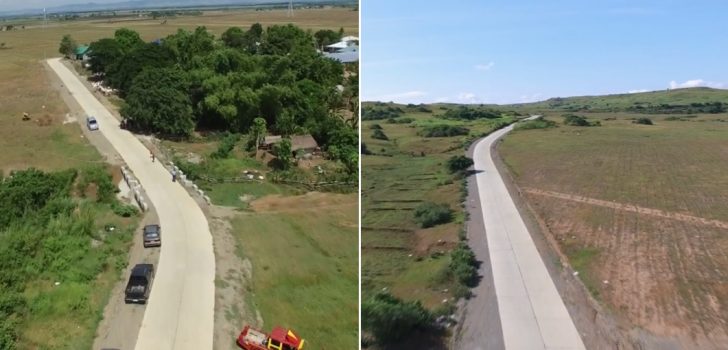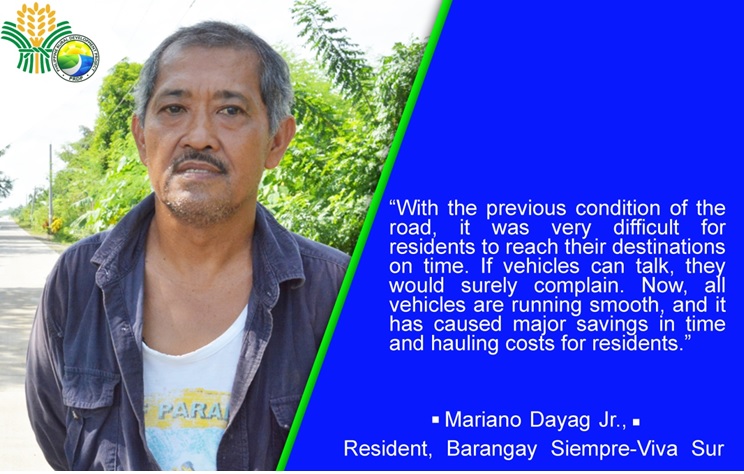 The Rehabilitation/Improvement of Magassi-Union-Camasi FMR in Cabagan (left) and the Rehabilitation/Construction of Olango-Siempre Viva-Trinidad-Manano Farm to Market Road in Mallig (right) are North Luzon’s first two completed FMRs, both situated in the province of Isabela.
The Rehabilitation/Improvement of Magassi-Union-Camasi FMR in Cabagan (left) and the Rehabilitation/Construction of Olango-Siempre Viva-Trinidad-Manano Farm to Market Road in Mallig (right) are North Luzon’s first two completed FMRs, both situated in the province of Isabela. Newly-constructed access roads ease difficulty of traveling in rural Isabela
“If vehicles could only talk, they would surely complain,” recalled Mariano Dayag Jr. as he described the previous condition of the road that connects Barangay Siempre Viva to the market.
For years, the roads connecting Barangays Siempre Viva, Manano, Olango and Trinidad to the urban areas were mostly passed by kuligligs, motorcycles or by foot. During rainy season, mud and flood would delay the delivery of goods to and from the farms and processing centers
Majority of the dairy farmers are situated relatively far from the national highway, leaving them with no choice but to traverse the rugged and muddy road. “With the road before, it was very difficult for residents to reach their destinations on time,” said Dayag.
With the joint efforts of the Philippine Rural Development Project (PRDP) and the local government unit (LGU), a P62.5 million road was completed, connecting the four barangays that would support the production of agricultural commodities in Mallig, particularly dairy.
“The access road would accelerate the development of the dairy zone, and open more opportunities to the local residents,” said Regional Project Coordination Office 2 Project Director Lucrecio R. Alviar, Jr.
The 9.17 kilometer access road resulted to a reduction of travel time by 71%, or savings of almost four minutes per kilometer.
In its neighbor municipality, a recently completed 4.9 kilometer farm-to-market road will also pave way for further agricultural growth for the municipalities of Cabagan and Tumauini. With a total cost of P40.2 million, it has greatly helped farmers and locals even in its early stages, and shall continue to serve Barangays Magassi, Mabangog, Union and Camasi in the years to come.
Janet Gannaban, from Barangay Camasi shared that with the previous road, she only goes to the market once a week, due to the lack of drivers willing to traverse the rough road.
“Now that it is paved, there are a lot of vehicles going to the market, allowing us to go to the market every two days,” said Gannaban. She added, “It is truly a great help to me as a vegetable seller who buys and sells products to and from the market.”
A typical rainy day in Camasi, Cabagan would result to a knee-level mud-filled road that would slow down the delivery of products, as recalled by the residents.
Through the completed rehabilitation of the Magassi-Union-Camasi, travelling the 4.9-km stretch reduced by almost 64%, exceeding both the subproject and PRDP target. With the PRDP intervention, traversing the road per kilometer reduced from an average of 16 minutes to six minutes during wet season. During dry season, ten minutes of travel time went down to almost four minutes.
Pilot subprojects as basis for future implementation
The two FMRs in Isabela serve as the first completed subprojects in North Luzon cluster. With this, a Rapid Appraisal of Emerging Benefits was conducted to assess if the aimed outcomes are achieved.
Held on October 10-14, the team composed of the Monitoring & Evaluation (M&E), InfoACE, I-BUILD and Economists jointly gathered feedback from the beneficiaries of the roads, findings of which will serve as basis for improving the system of implementation.
Through surveys, focus group discussions and spot interview, the composite team were able to gather vital data such as reduction in travel time, reduction in hauling cost, increase in traffic count, increase in production areas, reduction in transport losses, among others.
“This activity is an evaluation whether we have reached our goal, to have an initial sense of the success of PRDP in your cluster,” said National Project Coordination Office (NPCO) M&E Alternate Unit Head Jourvin Barrera. “We are after what we are supposed to hear, not what we want to hear.”
Being the pilot of the subprojects within the cluster, Director Alviar expressed full support in making necessary adjustments or improving approaches in the future implementations of upcoming subprojects.
“We (in Region 2) take the lead in the cluster’s subprojects, having already completed 2 FMRs. The immediate results of this activity will be the basis for the future SPs, and so we are taking criticisms constructively,” said Dir. Alviar.
He added, “there are always lessons learned.” (Kayla Arceo, PRDP North Luzon)

